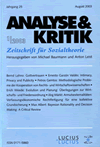Social Dimensions of Science

2010 (32) Issue 2
Editorial
The research program of Social Epistemology developed from a critique on philosophical epistemology around thirty years ago. Since then it has attracted an ever growing attention, mainly, however, among philosophers. But social epistemology offers also prolific alignments for the social sciences. The starting point of Social Epistemology is the elementary fact that a large proportion of our knowledge is acquired not by our own autonomous exploration according to some ideal standards but by relyi...
Table of Contents
Title: Scientific Knowledge and Scientific Expertise: Epistemic and Social Conditions of Their Trustworthiness
Author: Martin Carrier
Page: 195-212
Abstract: The article explores epistemic and social conditions of the trustworthiness of scientific expertise. I claim that there are three kinds of conditions for the trustworthiness of scientific expertise. The first condition is epistemic and means that scientific knowledge enjoys high credibility. The second condition concerns the significance of scientific knowledge. It means that scientific generalizations are relevant for elucidating the particular cases that constitute the challenges for expert judgment. The third condition concerns the social processes involved in producing science-based recommendations. In this context trust is created by social robustness, expert legitimacy, and social participation.
Title: Social Objectivity and the Problem of Local Epistemologies
Author: Anke Büter
Page: 213-230
Abstract: The value-freedom of scientific knowledge is commonly hold to be a necessary condition for objectivity. Helen Longino's contextual empiricism aims to overcome this connection. She questions the suitability of the normative ideal of value-freedom and develops an alternative conception of objectivity, which integrates social and epistemic aspects of scientific enquiry. The function of this notion of 'social objectivity' is to make value-laden assumptions assessable through a process of criticism, even if there cannot be any guarantee of their elimination. This assessability requires common standards of evaluation, which are threatened by Longino's rejection of the distinction between cognitive and non-cognitive values guiding theory choice. I will argue that in order to resolve this inherent tension, social objectivity has to be understood as based on a procedural epistemology and, differing from Longino's own approach, must include the normative requirement to strive for consensus instead of allowing for epistemological pluralism.
Title: The Division of Epistemic Labour
Author: Geoffrey Brennan
Page: 231-246
Abstract: The paper mobilizes Adam Smith's treatment of the division of labour in relation to the production, consumption and exchange of knowledge. One aspect of this mobilization deals with the epistemic demands that exchange makes on its participants. The other deals with increasing returns in the provision of knowledge itself, treating knowledge creation as just another example of specialization and exchange. These two aspects come together in relation to the epistemic demands associated with assessing knowledge quality. These demands differ according to whether the knowledge is embodied in products or whether the knowledge is an object for its own sake. It is argued that disciplines play a critical role as institutions for meeting the epistemic demands that the division of labour creates in the 'knowledge' case.
Title: Critical Rationalism and Scientific Competition
Author: Max Albert
Page: 247-266
Abstract: This paper considers critical rationalism under an institutional perspective. It argues that a methodology must be incentive compatible in order to prevail in scientific competition. As shown by a formal game-theoretic model of scientific competition, incentive compatibility requires quality standards that are hereditary: using high-quality research as an input must increase a researcher's chances to produce high-quality output. Critical rationalism is incentive compatible because of the way it deals with the Duhem-Quine problem. An example from experimental economics illustrates the relevance of the arguments.
Title: Governance by Numbers. Does It Really Work in Research?
Author: Margit Osterloh
Page: 267-283
Abstract: Performance evaluation in research is more and more based on numbers of publications, citations, and impact factors. In the wake of New Public Management output control has been introduced into research governance without taking into account the conditions necessary for this kind of control to work efficiently. It is argued that to evaluate research by output control is counterproductive. It induces to substitute the 'taste for science' by a 'taste for publication'. Instead, input control by careful selection and socialization serves as an alternative.
Title: Withering Academia?
Author: Bruno S. Frey
Page: 285-296
Abstract: Strong forces lead to a withering of academia as it exists today. The major causal forces are the rankings mania, increased division of labor in research, intense publication pressure, academic fraud, dilution of the concept of 'university', and inadequate organizational forms for modern research. Academia, in a broader sense understood as 'the locus of seeking truth and learning through methodological inquiry', will subsist in different forms. The conclusion is therefore pessimistic with respect to the academic system as it presently exists but not to scholarly endeavour as such. However, the transformation predicted is expected to be fundamental.